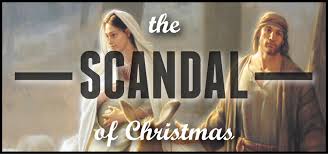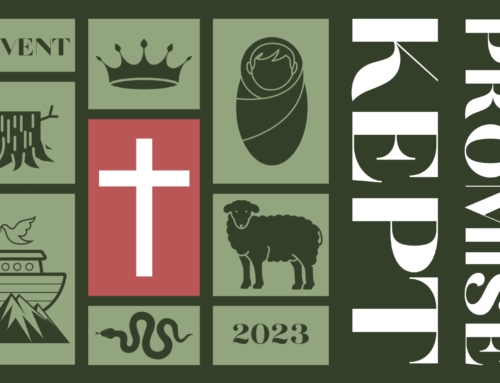The Sandal of Jesus’ Birth
By Pastor Josh Wamble
When we think of Jesus’ life, several scandalous truths may come to mind. It was common for Jesus to be seen eating and socializing with outcasts—even welcoming them though also challenging them with their sin. In Matthew 8, Jesus said about himself, “the Son of Man has no place to lay his head.” It is scandalous that the King of the universe came to his creation in humility not in regalia. It is also scandalous that as John says, when Jesus did come to his creation in humility, “his own people did not receive him.”
Perhaps the most scandalous part of Jesus’ life is that he died the death of a disgraced, humiliated, criminal on a cross for the sins of his people. The fact that the God who created the heavens and earth and holds them together died is scandal enough. The manner in which he died adds to the scandal and magnifies it almost beyond belief. Yet there is another aspect of Jesus’ life that is scandalous, and it comes not at the end of his life but at the beginning.
Matthew begins his gospel with a genealogical introduction to Jesus. He traces Jesus’ family lineage through Joseph and David back to Abraham. There is nothing particularly noteworthy about this. Genealogies are fairly common in the bible, and this is how Luke begins his gospel account as well. What is noteworthy about Matthew’s account is some of the people he includes. In particular, Matthew includes five women in his genealogy of Jesus. None of these women are necessary to the genealogy. If Matthew had left them out, we would still have a full account of Jesus’ ancestors from Joseph to Abraham. Yet, Matthew included them on purpose, I think, to teach us something about Jesus and about us. As we look at the background and history of these five women, we will attempt to see just what that is.
1. TAMAR
The first woman mentioned is Tamar. Tamar’s history is found in Genesis 38. She was the daughter-in-law of Judah, and yet Matthew says that Perez and Hezra were Judah’s sons through her. What happened was Tamar married Judah’s firstborn son, Er. Er died without having an heir. So, based on Jewish custom and law, Judah gave Tamar his second son, Onan, to provide an heir for Er. Onan didn’t like the idea of having a son who would be counted the son of his older brother, so he sabotaged the marriage bed and refused to fulfill his duty toward his older brother. Because of this wickedness, the Lord struck Onan, and he died too.
Tamar was now left a widow of both Judah’s sons. Judah came to her and promised that he would give her his last son, Shelah, as a husband once he reached marrying age. when Shelah grew up, Judah failed to give him to Tamar because he was afraid that he would die like his two older brothers.
When Tamar found out, she devised a plan. She found out about a trip that Judah would be taking, and she set a trap. She dressed as a prostitute, set up on the road the Judah would be traveling, and waited for him. When he came by, she enticed him to sleep with her. Judah did, not knowing that she was his daughter-in-law. Tamar became pregnant with twins, and one of them, Perez, is an ancestor of Jesus. God used Tamar and Judah despite both of them acting through immorality, trickery, and unrighteousness.
2. RAHAB
We first read about Rahab in Joshua chapter 2. Joshua is preparing to lead the Israelites into the Promised Land but before he does, he sends out two spies to check out the land—especially a city called Jericho. When the spies reach the city, a prostitute named Rahab invites them into her house. She tells them that she has heard all about what God had done for the Israelites—how he parted the Red Sea and delivered them from Egypt and how he protected them through their migration. She told them that she knew God had given them the land and that he was the true creator of heaven and earth.
When the King of Jericho heard that the spies were there and sent men to find them, she hid them on the roof of her house amid the flax crop. She sent the King’s men on a wild goose chase and gave the spies directions on how to leave travel back to their camp without being caught.
Before she let them down by rope through a window cut in the city wall, she made them promise that they would return the favor when they Israelite army invaded Jericho. She made them promise that they would not destroy her or her family. They promised that no harm would come to her or anyone who took refuge in her house when God gave them the city.
In Joshua chapter 6, we read about the Israelites keeping their promise. God supernaturally caused the walls of Jericho to fall, and the Israelites conquered the city utterly destroying it by fire. However, they did not harm one prostitute and her family who were citizens of Jericho. Instead, they accepted them as Jewish proselytes. When Joshua wrote his history, he even indicated that Rahab had lived in Israel up until his very own day.
Matthew tells us that Rahab was assimilated into the Israelite people so fully that she even, at some point, married Salmon and became the mother of Boaz who was David’s great-grandfather and a distant ancestor of Jesus. So, not only did God use immoral, unrighteous, conniving people like Judah and Tamar, but he also even used a Canaanite prostitute to bring about the birth of his son into the world.
3. RUTH
The third woman listed in Matthew’s genealogy is Ruth. Ruth has an entire book in the Old Testament dedicated to telling her story. She was a gentile Moabite who ended up being the great-grandmother of David and an ancestor of Jesus.
An Israelite named Naomi and her husband, Elimilech, moved to Moab with their sons Chilion and Mahlon to escape a famine in Israel. While in Moab Naomi’s husband, Elimilech died, and the two sons, Mahlon and Chilion, married Moabite women named Orpah and Ruth. After living in Moab for around ten years, both of Naomi’s sons, Mahlon and Chilion, died as well. This left Naomi, along with Orpah and Ruth, as widows.
Naomi pleaded with Orpah and Ruth to return to their families, remain in Moab, and remarry so that they would be provided for and taken care of. Orpah complied, but Ruth refused and accompanied Naomi back to Israel.
When they returned to Israel, Ruth went out to glean grain from he fields and met a generous man named Boaz. Boaz, a relative of Naomi’s husband, Elimilech, ended up marrying Ruth as her and Naomi’s kinsman redeemer and providing an offspring, Obed, who became the grandfather of David.
So, in the case of Ruth, we see that God providentially set up a famine, a “chance” meeting between Chilean and Ruth, another chance meeting between Ruth and Boaz, and the Hebrew custom of Levirate marriage and the kinsman redeemer to work it out so that a gentile Moabite was included in the genealogy of Jesus.
4. URIAH’S WIFE
Matthew doesn’t mention the fourth woman by name. Instead, he refers to her as the wife of Uriah. I wonder if this is because he wants to emphasize the sinfulness of Bathsheba’s introduction to David. The story begins with the narrator signally to us that David was not fully meeting his duty as the king. It was in the spring when kings go off to war, yet David was at home. Through a window of his palace he noticed Bathsheba bathing. He was attracted to her, and instructed his servants to bring her to him. They did, and David slept with her.
When she became pregnant, David began planning ways to hide his sin. First he called for Uriah, her husband, to come back from battle. He hoped that Uriah would sleep with Bathsheba, and everyone would assume that he had fathered the child. Uriah refused on the grounds that he did not want to enjoy any comforts that his fellow soldiers did not have access to. David’s second attempt was to throw a banquet in Uriah’s honor the next night, get him drunk, and send him home to Bathsheba. When Uriah still refused to sleep with her, David had to resort to extreme measures.
He sent Uriah back to the battle with sealed instructions for his commander. The commander was instructed to put Uriah on the front lines of his forces, charge the enemy, and then call for a retreat without telling Uriah. Left by himself, Uriah was easily killed by the enemy army. Once David received word that Uriah had been killed, he married Bathsheba, and everyone assumed the baby was conceived after their marriage.
While Bathsheba may have been entirely a victim in the story recorded in 2 Samuel 11, the encounter is full of sin on top of sin, immorality, attempts to cover up sin, and even murder. Yet, Matthew includes her in Jesus’ genealogy.
More importantly, God includes her in Jesus’ genealogy. Again, we see God take a totally messed up situation and not only bring good out of it, but use it to bring about his good and perfect purposes—even his very will to send his son as the savior for people involved in such messed up situations.
5. MARY
The last woman mentioned by Matthew is, of course, Mary—Jesus’ mother. Her story is preserved for us in the succeeding chapters of Matthew’s gospel as well as in other parts of the New Testament.
While Mary was not involved in any sin as far as giving birth to Jesus was concerned, she was perceived by those around her as immoral and adulterous. God could have worked it out so that Jesus was born as the son of a King or a nobleman. However, it was God’s plan for the messiah to be born of a commoner in a way that would be unbelievable as far as earthly logic goes. The true explanation was impossible if not for the work of the Holy Spirit.
Even her betrothed, Joseph, who knew her best and rusted her most did not believe her until an angel appeared to him and confirmed that the baby she was carrying was in fact conceived by the Holy Spirit not through sexual unfaithfulness and immorality. It was not until then that he changed his mind about divorcing her and putting her away (even if he had planned to do so quietly so as to save her reputation as much as possible).
In this genealogy, we see five women included. I think it is undeniable that Matthew includes them on purpose and for a reason. In fact, I think he means to teach us several truths. Some of them are listed below:
1. One of the biggest truths illustrated here is that Jesus is one of us. Just like many (all?) of us have families that are messy and often messed up, Jesus comes from a long line of sinners as well. He truly did become one of us. He had black sheep in his heritage just like we do. Further, it doesn’t seem that he is ashamed of that—in fact, the author of Hebrews in Hebrews 2:11 tells us explicitly, “He is not ashamed to call them brothers.”
2. Secondly, we see that God’s plan will come about. God is the sovereign ruler of his creation, and he will do what he wants to do. He providentially controls the events of the world and the decisions of his creatures in a way that brings about his purposes. He will bring his messiah into the world and keep the promises that he made long ago.
3. Finally, and related to the last truth, the success of God’s plan is not dependent on the righteousness of people. God will succeed in spite of our failures. In fact, God uses our failures to bring about his plan.
God was able to take Tamar in spite of her immoral conniving against a sinful Judah, Rahab in spite of her history as a Canaanite prostitute, Ruth inspire of her background as an idol worshipping Moabite, the immoral incident between David and Bathsheba, and the supposed immorality of Mary and bring about his plan to provide the world with a savior.
A corollary of this is that God is also able to take sinful people like you and me and (in spite of all our sinful histories, situations, and actions) establish and expand his kingdom in the world. He is able to providentially take our disobedience and unfaithfulness and use it to bring about the salvation of the nations and our own sanctification. And, make no mistake, he will bring his plan to completion through an imperfect and often less than fully faithful church.
One day, Jesus will return to judge the world in righteousness and remove the last lingering remnants of sin forever! When he does, we will be able to look back and see how he providentially worked a million situations just like Rahab’s and Tamar’s and mine and yours into salvation for us and for the nations around us!



